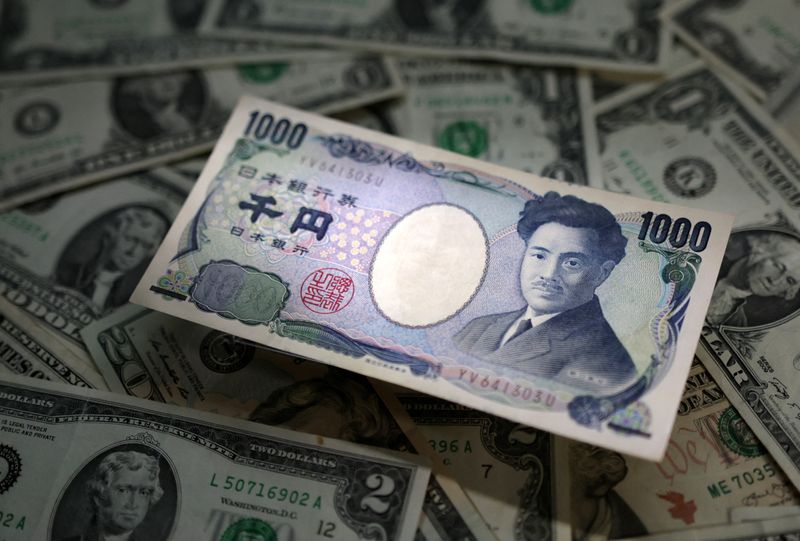By Ankur Banerjee
SINGAPORE (Reuters) -The yen crumbled on Wednesday after a Financial institution of Japan official performed down the possibilities of a near-term charge hike in a recent twist to the week that began with huge strikes pushed by U.S. recession fears and unwinding of widespread carry trades.
The yen was final down greater than 2% at 147.69 per greenback having touched session lows of 147.935 following the feedback from BOJ Deputy Governor Shinichi Uchida. The final time the yen dropped over 2% was in March 2020.
“As we are seeing sharp volatility in domestic and overseas financial markets, it’s necessary to maintain current levels of monetary easing for the time being,” Uchida mentioned. His remarks contrasted with Governor Kazuo Ueda’s hawkish feedback made final week when the BOJ unexpectedly raised rates of interest.
“I cannot fathom why they needed to say that they won’t hike rates in turbulent times, unless of course the goal is to signal no more hikes and to weaken the yen they just strengthened,” mentioned Matt Simpson, a senior market analyst at Metropolis Index.
The speed hike from BOJ final week together with bouts of interventions from Tokyo in early July led buyers to bail out of once-popular carry trades, wherein merchants borrow the yen at low charges to put money into dollar-priced belongings for greater returns.
That took the yen to a seven-month excessive of 141.675 per greenback on Monday, from the 38-year lows of 161.96 it was languishing in simply firstly of July.
However Uchida’s feedback may nonetheless prop up the carry commerce, buyers say, even with extra room for unwinding of the trades.
“Uchida has saved the carry trade – for now,” mentioned Rong Ren Goh, a portfolio supervisor within the fastened earnings workforce at Eastspring Investments.
“There are also other moving parts, but yes, Japan policy is one of the important moving parts of the overall risk structure in the market. The other important ones would be U.S. economic data, which in turn informs Fed policy trajectory.”
The swing in yen positioning seen during the last one month was among the many largest on file, in response to strategists at JP Morgan, with their fashions suggesting 65% of yen shorts have now been coated as of Aug. 6.
This week’s market volatility was exacerbated by a softer-than-expected U.S. job report on Friday, and disappointing earnings from main tech corporations, sparking a worldwide sell-off in riskier belongings as buyers feared the U.S. financial system was heading for a recession.
Merchants have additionally adjusted their expectations from the Federal Reserve this yr following the smooth jobs report final week, with almost 105 foundation factors of easing anticipated by year-end.
Markets at the moment are pricing in a 70% likelihood of the Fed slicing charges by 50 bps in September, CME FedWatch device confirmed, in contrast with 85% likelihood a day earlier, with main brokerages additionally anticipating a big charge lower within the subsequent assembly.
Some analysts although anticipate the Fed to take a measured strategy.
“My sense is that the Fed is doing what it does, it wants some reaffirmation of the trend from several data points … before drawing a conclusion,” mentioned Aninda Mitra, head of Asia macro and funding technique at BNY Advisors Funding Institute.
“Whereas the market looked at one NFP print … and jumped to the conclusion that a rate cut was needed,” Mitra mentioned, referring to final week’s smooth jobs knowledge.
On Wednesday, the euro eased barely to $1.0916, whereas sterling final fetched $1.27135, not removed from the five-week low it hit within the earlier session.
The , which measures the foreign money in opposition to six rivals, rose 0.27% to 103.26, inching additional away from the seven-month low of 102.15 it touched on Monday.
In different currencies, the Australian greenback was 0.61% greater at $0.65585, a day after the central financial institution dominated out the opportunity of an rate of interest lower this yr, saying core inflation is predicted to come back down solely slowly.

The has struggled in latest days, sinking to eight-month lows on Monday within the wake of the worldwide markets meltdown however perked up on the day following BOJ feedback.
The New Zealand greenback was up 0.98% at $0.60125 following sturdy jobs knowledge.




